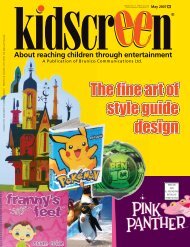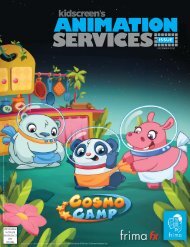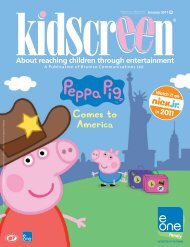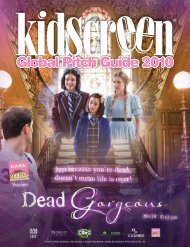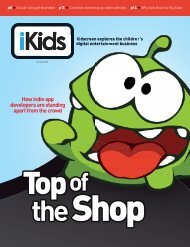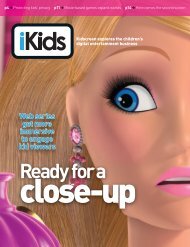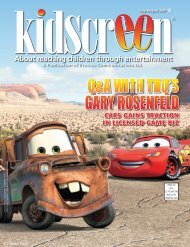download a PDF version - Kidscreen
download a PDF version - Kidscreen
download a PDF version - Kidscreen
You also want an ePaper? Increase the reach of your titles
YUMPU automatically turns print PDFs into web optimized ePapers that Google loves.
Anarchy in the UK?<br />
CBeebies head of production, animation and acquisitions Alison Stewart says the<br />
growing demand for this type of programming is being driven in the UK by the country’s<br />
early-years educational initiative in which teachers role-play and ask kids openended<br />
questions that encourage them to share their thoughts and think for themselves.<br />
Part of the program’s mandate is to go beyond lessons that teach specifi c knowledge of<br />
numbers and introduce broad-based critical-thinking skills.<br />
“The idea is that if children get a little more teaching along those lines, it gives them<br />
more inquiring minds as they grow up,” says Stewart. She also points to a growing<br />
appreciation for engendering the notion of community in society, which has led to<br />
the creation of TV programming that gets<br />
children to think about each other, work<br />
together and share.<br />
“There is some beautiful content coming<br />
through that is all based on diverse communities<br />
learning to live together,” says Stewart.<br />
Fitting the bill is CBeebies’ new 2012 show<br />
Tilly and Friends (Walker Books/Jam Media)<br />
that’s based on a series of children’s books<br />
about a little girl and her six animal pals who<br />
In CBeebies’ Mr. Bloom’s Nursery, kids<br />
learn to grow and nurture a garden while<br />
taking care of baby veggie puppets<br />
that need their help<br />
34 February/March 2011<br />
The mind of<br />
a preschooler<br />
“If you want to understand a child’s IQ or intellectual<br />
capacity, it’s best to look at how they cope emotionally,”<br />
says Jacqueline Harding, former BBC education editor<br />
and current director of London-based research and<br />
consulting fi rm, Tomorrow’s Child.<br />
Harding explains that the brain’s limbic system,<br />
which regulates functions like emotion, behavior and<br />
long-term memory, develops hand-in-hand with the<br />
brain’s executive functions that help us plan, evaluate<br />
and make decisions. So early emotional experiences<br />
actually become embedded in the architecture of the<br />
brain, says Harding, meaning the emotional state of<br />
young children directly infl uences how they learn.<br />
“Brain development from infancy to age fi ve is so<br />
rapid that it’s the time to talk about early experiences<br />
and cognitive development, particularly in relation<br />
to media,” says Harding. She argues that the way<br />
children react to TV characters mirrors the way they<br />
react to people in real life. So when helping to develop<br />
preschool shows, she takes a close look at what the<br />
characters are saying to the child and how they refl ect<br />
that child’s stage in life. (Refl ecting a preschooler’s<br />
sense of humor, for example, involves depicting a bit<br />
of overall slapstick silliness.)<br />
Harding says showing children <strong>version</strong>s of themselves<br />
on-screen is the starting point for teaching them<br />
how to cope with more complex emotions like jealousy<br />
and disappointment, and how to recover from failure<br />
and try again. This level of emotional intellect, says<br />
Harding, is what translates into positive dispositions for<br />
learning academic concepts like numbers and words.<br />
“Healthy development depends on the quality and<br />
reliability of a young child’s relationship with important<br />
people in their life,” says Harding. “If we can mirror that<br />
on-screen and manage it in a safe way, we are doing<br />
children such a favor.” –Kate Calder







